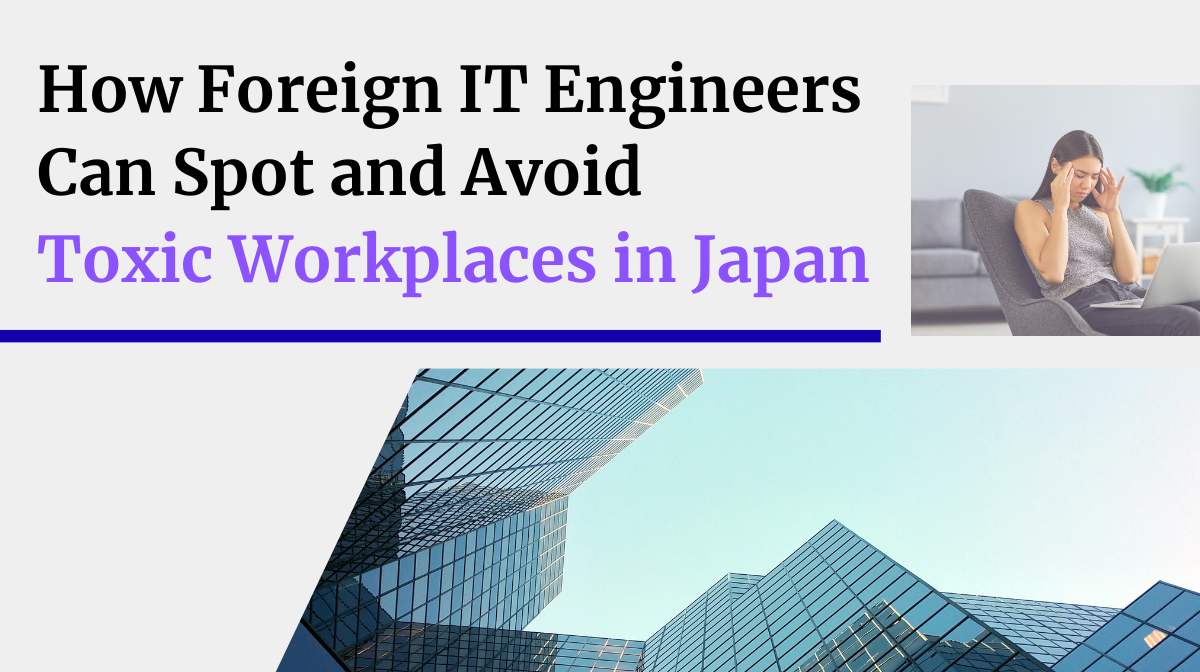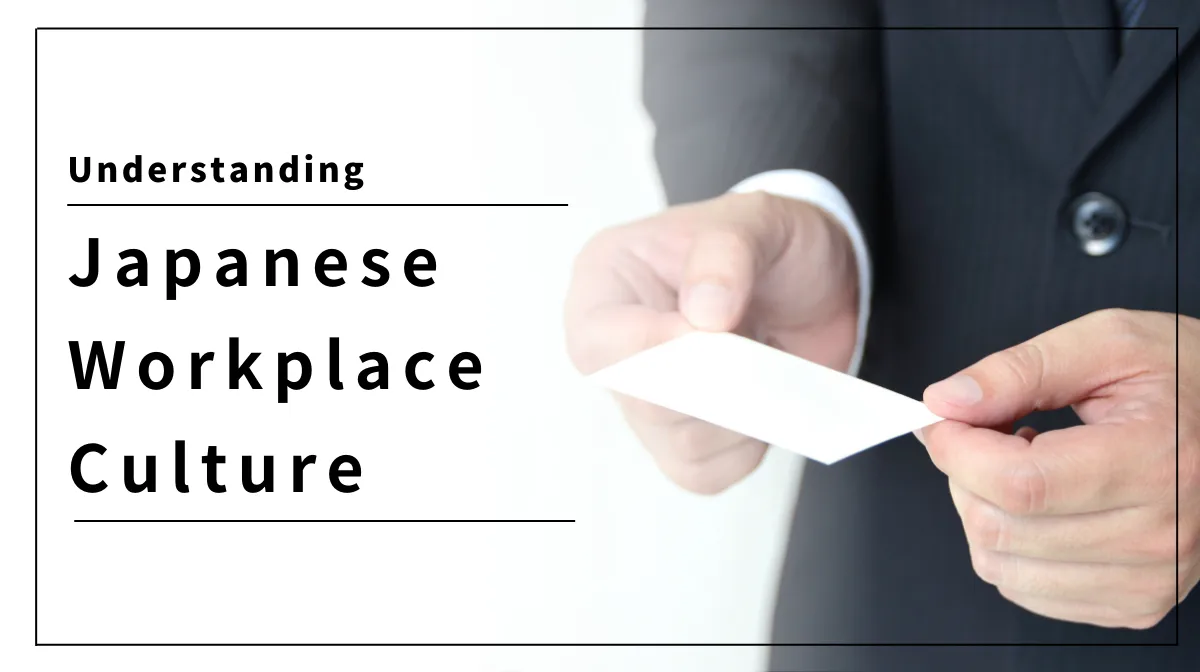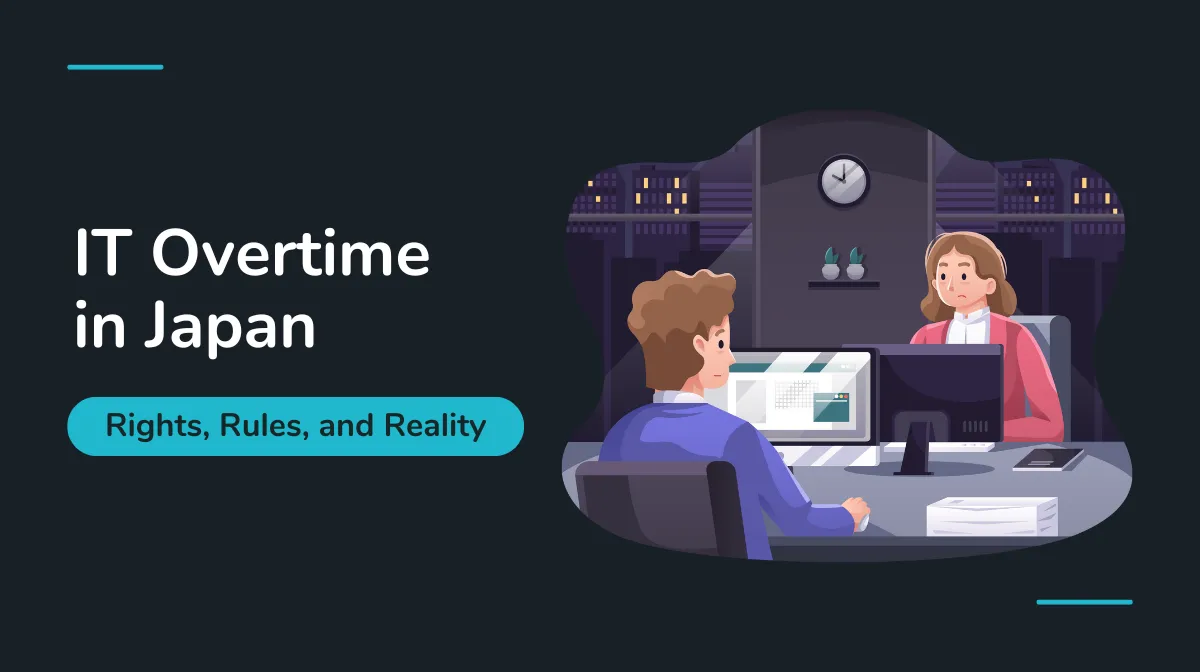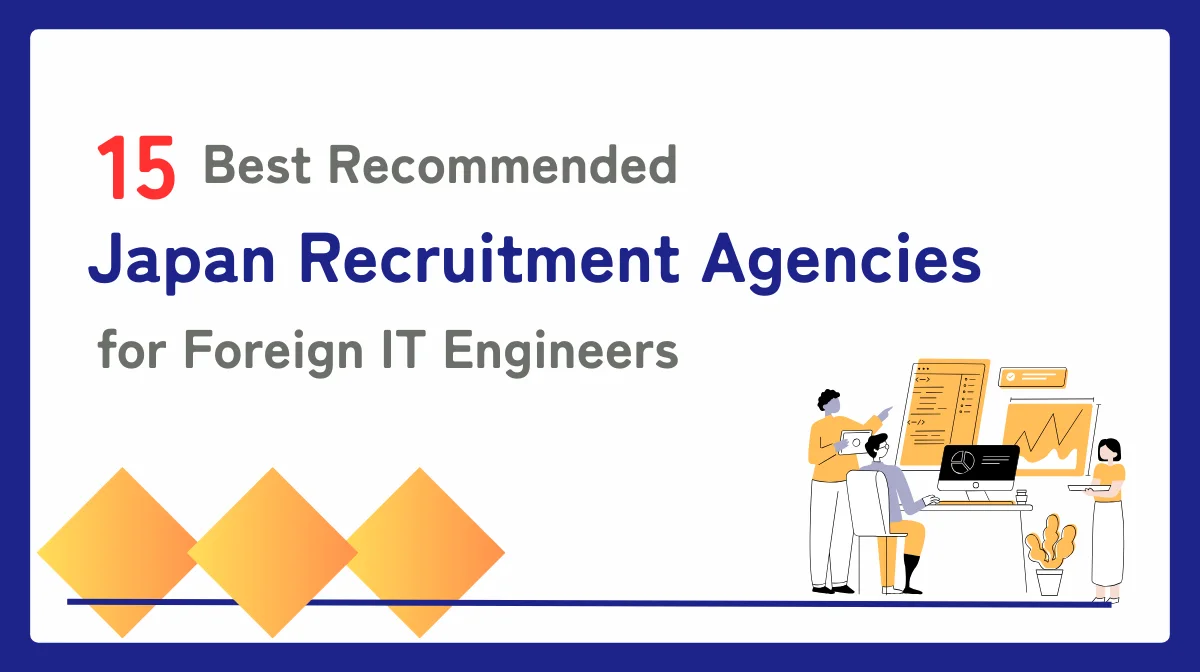Working in Japan as a foreign IT engineer requires careful attention to company selection. Bad companies, known as “black companies” in Japan, often target foreign workers due to visa dependency and language barriers.
This guide helps you recognize signs of a bad company in Japan from job hunting to employment, ensuring you find a healthy workplace for your career success.
- How to identify toxic workplace signs during job hunting.
- Ways to use government data for employer screening.
- Resources available when facing workplace exploitation.
1. Understanding Signs of a Toxic Workplace in Japan: What Foreign Engineers Need to Know
Toxic workplaces in Japan typically exploit workers through illegal practices and poor working conditions. The Ministry of Health, Labour and Welfare identifies three main characteristics that serve as clear warning signs.
Key Warning Signs of Toxic Workplaces
The most obvious signs of a toxic workplace in Japan include forcing excessive overtime without proper agreements, creating harmful workplace cultures with unpaid overtime and harassment, and systematically eliminating employees who don’t comply with unreasonable demands.
These companies often use “black training” programs designed to break down employee resistance rather than provide genuine professional development.
Why Foreign Engineers Face Higher Risks
Foreign engineers become prime targets for exploitation because they depend on employers for visa sponsorship and renewal. This dependency creates power imbalances that toxic workplaces readily exploit.
Language barriers compound these problems when contracts and company policies exist only in Japanese, making it difficult to understand working conditions fully. Many foreign workers also lack knowledge about Japanese labor consultation services, leaving them isolated when problems arise.
■Related Reading
Understanding Japan’s unique workplace culture is essential before diving into job hunting strategies.
2. Recognizing Signs of a Toxic Workplace in Japan Through Job Postings
The earliest opportunity to identify a toxic workplace comes during the job search phase. Several red flags in job postings serve as reliable warning signs.
Suspicious Salary Patterns
Companies offering salaries dramatically higher or lower than industry standards often hide problematic conditions. Extremely low base salaries combined with unrealistic performance bonuses typically indicate exploitative pay structures.
Conversely, advertisements featuring unrealistically high salaries usually involve dangerous working conditions or impossible performance targets that make such compensation unattainable for most employees.
Excessive Fixed Overtime Policies
Job postings mentioning fixed overtime exceeding 60 hours monthly represent major warning signs of a toxic workplace in Japan. These arrangements often hide actual working hours that far exceed legal limits.
Legitimate companies provide clear explanations about overtime policies, actual average working hours, and additional compensation for hours beyond fixed amounts. Companies avoiding these discussions typically operate outside legal boundaries.
Constant Hiring and High Turnover Indicators
Companies continuously posting job openings or advertising mass hiring campaigns often struggle with employee retention due to poor working conditions. While business growth can justify increased hiring, persistent recruitment usually indicates high turnover rates.
Research three-year employee retention rates when possible. IT industry averages range from 27-29%, so companies exceeding 30% turnover rates warrant careful investigation.
■日本でエンジニアとしてキャリアアップしたい方へ
海外エンジニア転職支援サービス『 Bloomtech Career 』にご相談ください。「英語OK」「ビザサポートあり」「高年収企業」など、外国人エンジニア向けの求人を多数掲載。専任のキャリアアドバイザーが、あなたのスキル・希望に合った最適な日本企業をご紹介します。
▼簡単・無料!30秒で登録完了!まずはお気軽にご連絡ください!
Bloomtech Careerに無料相談してみる
3. Interview Warning Signs of a Toxic Workplace in Japan

Face-to-face interactions during interviews and company presentations reveal important information about workplace culture and management practices.
Problematic Interview Behavior
Interviewers focusing exclusively on “fighting spirit” and “dedication” while avoiding concrete discussions about working conditions often represent toxic workplaces. These conversations typically emphasize emotional commitment over professional development or fair compensation.
Watch for illegal questions about personal beliefs, family situations, or political views, as these violations indicate poor legal compliance awareness throughout the organization.
Lack of Support for Foreign Employees
Companies serious about employing foreign engineers provide multilingual documentation, clear explanations of working conditions, and established consultation channels for cultural differences.
Toxic workplaces often expect foreign employees to navigate entirely Japanese-language systems without support, creating additional barriers that facilitate exploitation.
■Related Reading
Master the interview process with comprehensive preparation strategies designed for foreign engineers.
4. Using Public Data to Identify Signs of a Toxic Workplace in Japan
Government and private databases provide objective information for evaluating potential employers beyond company presentations.
Official Government Records
The Ministry of Health, Labour and Welfare publishes lists of companies receiving official guidance for labor law violations. Search their website for “Public Cases Related to Labor Standards Law Violations” to verify whether target companies have documented legal problems.
Financial and Employment Data Analysis
Publicly traded companies must disclose employee statistics in securities reports available through EDINET. Key indicators include sudden employee count changes, below-average compensation, short average tenure periods, and excessive overtime hours exceeding 45 hours monthly.
Employee Review Platforms
Websites like OpenWork provide insider perspectives on working conditions, though these sources require careful evaluation. Focus on consistent patterns across multiple reviews rather than isolated extreme opinions, and consider when reviews were posted relative to current conditions.
■Related Reading
Navigate overtime regulations and protect your work-life balance in Japan’s demanding tech environment.
■日本でエンジニアとしてキャリアアップしたい方へ
海外エンジニア転職支援サービス『 Bloomtech Career 』にご相談ください。「英語OK」「ビザサポートあり」「高年収企業」など、外国人エンジニア向けの求人を多数掲載。専任のキャリアアドバイザーが、あなたのスキル・希望に合った最適な日本企業をご紹介します。
▼簡単・無料!30秒で登録完了!まずはお気軽にご連絡ください!
Bloomtech Careerに無料相談してみる
5. IT Industry Signs of a Toxic Workplace in Japan

The technology sector presents unique exploitation patterns that foreign engineers should recognize.
Problematic Client Staffing Arrangements
Many toxic workplaces in Japan’s IT sector use multi-layered subcontracting structures that significantly reduce employee compensation while maximizing company profits. These arrangements often result in salary return rates around 50% or lower of actual billing amounts.
Companies operating these systems typically provide minimal project information before assignments, offer no salary guarantees during project gaps, and isolate employees at client sites without adequate support structures.
Fake Agile Development Practices
Some companies misuse agile development terminology to justify excessive working hours and poor project management. Genuine agile practices emphasize sustainable development paces and team collaboration, while exploitative versions demand individual sacrifice and constant overtime.
Legitimate vs Exploitative Practices
- Sustainable pace vs Constant overtime
Real agile maintains reasonable working hours - Team collaboration vs Individual burden
Proper implementation distributes work fairly - Quality focus vs Deadline obsession
Authentic agile prioritizes long-term success - Continuous improvement vs Quick fixes
Genuine practices build better processes
■Related Reading
Learn effective strategies for changing jobs and advancing your career in Japan’s competitive market.
6. Taking Action Against Signs of a Toxic Workplace in Japan
Discovering you’ve joined a problematic company doesn’t mean accepting poor treatment. Multiple resources exist to protect foreign workers’ rights.
Available Support Resources
Government Consultation Services
- Ministry of Health, Labour and Welfare Foreign Worker Hotline (multilingual support)
- Prefectural Labor Bureau consultation corners
- Labor Standards Inspection Offices for legal violations
Professional Exit Services
- Resignation agencies for difficult departure situations
- Legal consultation services
- Worker advocacy organizations
Early action provides the best outcomes when dealing with workplace problems. Don’t endure poor conditions hoping for improvement, as toxic workplaces rarely change their fundamental practices.
7. Staying Safe from Signs of a Toxic Workplace in Japan

Recognizing signs of a toxic workplace in Japan requires careful evaluation during job hunting and interviews. Use government databases, employee reviews, and transparent company communication as key indicators. Trust employers who provide clear policy explanations and multilingual support.
Remember that visa dependency shouldn’t force you to accept exploitation—government consultation services offer multilingual assistance for foreign workers facing workplace problems.
Key Takeaways for Foreign IT Engineers
- Research thoroughly
Use multiple sources including government databases and employee reviews - Ask specific questions
Don’t accept vague answers about overtime, benefits, or working conditions - Watch for red flags
Excessive fixed overtime, high turnover, and poor foreign worker support - Know your rights
Familiarize yourself with Japanese labor laws and available consultation services - Act early
Don’t wait if you notice toxic workplace patterns developing
By staying vigilant and using these screening methods, foreign IT engineers can successfully navigate Japan’s job market while avoiding the significant risks associated with toxic workplaces
■Related Reading
Connect with top recruitment agencies that specialize in placing foreign IT professionals in quality companies.
8.Essential Strategies for Avoiding Toxic Workplaces in Japan
Foreign IT engineers in Japan face unique vulnerabilities due to visa dependency and language barriers. This guide identifies key warning signs including excessive fixed overtime (over 60 hours monthly), suspicious salary patterns, high employee turnover, and lack of multilingual support.
Critical strategies include thorough research using government databases and employee reviews, asking specific questions about working conditions during interviews, and recognizing IT industry-specific exploitation patterns like problematic subcontracting structures.
Early detection during job hunting proves most effective. Government consultation services and professional support networks provide essential resources for workers facing problems. Remember that visa dependency should never force acceptance of exploitation—legitimate support systems exist to protect foreign workers’ rights in Japan’s tech industry.






















